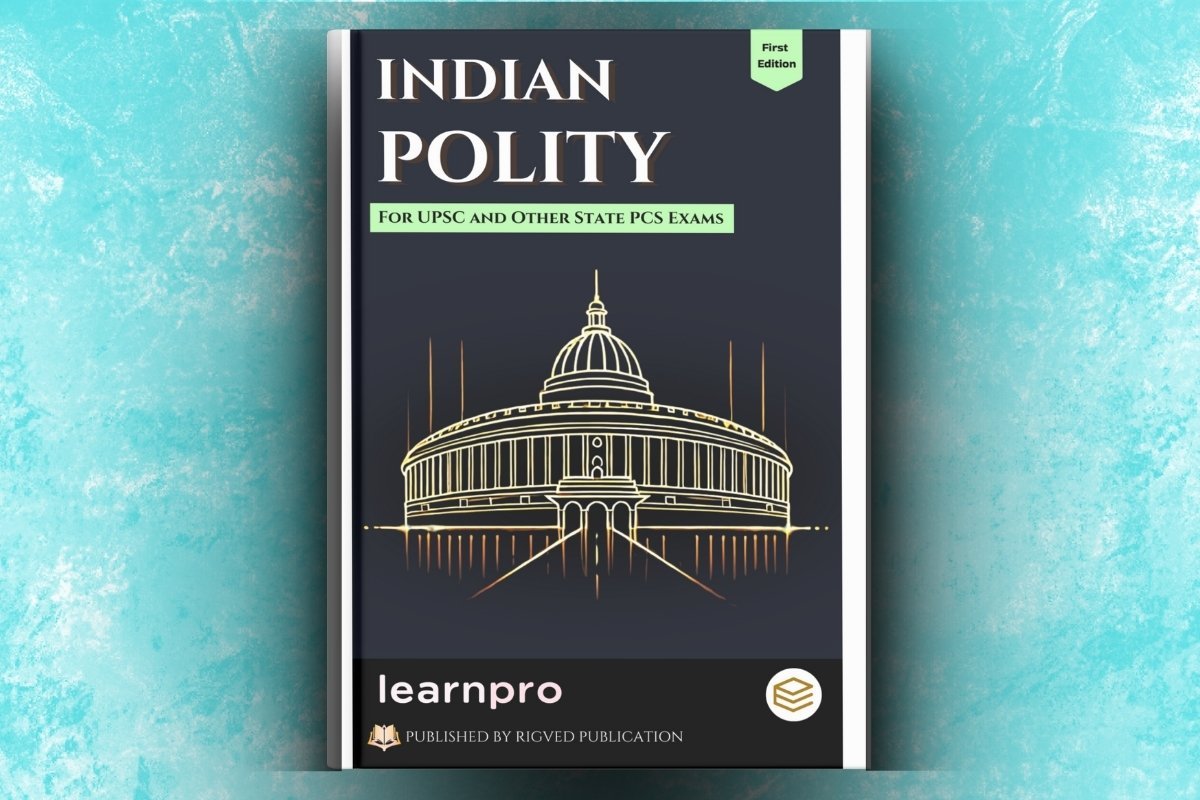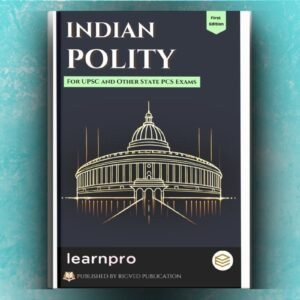Indian Polity Notes for UPSC and State PCS
Original price was: ₹499.00.₹199.00Current price is: ₹199.00.
Indian Polity is a core subject for UPSC Civil Services Examination (CSE) and State Public Service Commission (PCS) exams. It covers the Constitution, governance structures, legal framework, and administrative mechanisms that define India’s political system. A thorough understanding of Indian Polity is essential for Prelims, Mains (GS-II), and Essay Paper.
Guaranteed Safe Checkout
- Satisfaction Guaranteed
- No Hassle Refunds
- Secure Payments
Description
Chapters in this Book
Introduction to Indian Polity
- Meaning and Scope of Indian Polity
- Evolution of Political System in India
- Basic Concepts of Governance, Constitution, and Democracy
Historical Background of the Indian Constitution
- Constitutional Developments During British Rule
- Regulating Act 1773 to Government of India Act 1935
- Indian Independence Act 1947 and Transition to Democracy
Making of the Indian Constitution
- Constituent Assembly: Composition and Functions
- Drafting Committee and Role of B.R. Ambedkar
- Sources and Influences on the Indian Constitution
- Objectives Resolution and Adoption of the Constitution
Salient Features of the Indian Constitution
- Federalism with a Unitary Bias
- Parliamentary Democracy and Separation of Powers
- Judicial Independence and Social Welfare Orientation
- Features Borrowed from Other Constitutions
The Preamble of the Indian Constitution
- Philosophy and Ideals of the Constitution
- Meaning and Significance of “Sovereign, Socialist, Secular, Democratic, Republic”
- Interpretation of Justice, Liberty, Equality, and Fraternity
Fundamental Rights (Part III)
- Meaning, Importance, and Scope of Fundamental Rights
- Right to Equality, Right to Freedom, and Right Against Exploitation
- Right to Freedom of Religion, Cultural & Educational Rights, and Right to Constitutional Remedies
- Landmark Supreme Court Judgments on Fundamental Rights
Directive Principles of State Policy (DPSP) (Part IV)
- Difference Between Fundamental Rights and DPSP
- Socialist, Gandhian, and Liberal-Intellectual Principles
- Importance in Policy Making and Governance
Fundamental Duties (Part IVA)
- List of Fundamental Duties and Their Significance
- Role in Promoting Citizenship and Nationalism
- Supreme Court Rulings on Fundamental Duties
Union and Its Territory (Part I)
- Formation of States and Union Territories
- Provisions of Article 1-4 of the Constitution
- Reorganization of States: Linguistic and Political Basis
Citizenship (Part II)
- Constitutional Provisions of Citizenship (Article 5-11)
- Citizenship Act 1955: Provisions and Amendments
- Concept of Overseas Citizenship of India (OCI) and Dual Citizenship Debate
The Parliament of India (Part V)
- Structure and Composition: Lok Sabha and Rajya Sabha
- Powers and Functions of Parliament
- Law-Making Process and Role of the Speaker
- Parliamentary Privileges and Committees
The President and Vice President (Part V)
- Election, Powers, and Functions of the President
- Ordinance-Making Power of the President
- Impeachment Process and Role in Parliamentary Democracy
The Prime Minister and Council of Ministers (Part V)
- Powers and Functions of the Prime Minister
- Role of Cabinet and Ministerial Responsibility
- Difference Between Presidential and Parliamentary System
The Governor and State Executive (Part VI)
- Appointment, Powers, and Functions of the Governor
- Discretionary Powers and Role in State Governance
- Relationship Between Governor and Chief Minister
The State Legislature (Part VI)
- Structure: Unicameral vs. Bicameral Legislatures
- Powers and Functions of State Legislative Assembly & Legislative Council
- Law-Making Process in States
The Judiciary: Supreme Court, High Courts, and Subordinate Courts (Part V & VI)
- Composition and Jurisdiction of the Supreme Court
- Role of the Chief Justice of India (CJI)
- Judicial Review, Judicial Activism, and Public Interest Litigation (PIL)
Centre-State Relations (Part XI & XII)
- Division of Powers: Union, State, and Concurrent Lists
- Administrative, Legislative, and Financial Relations
- Inter-State Disputes and Mechanisms to Resolve Them
Emergency Provisions (Part XVIII)
- National Emergency (Article 352)
- President’s Rule (Article 356) and State Emergency
- Financial Emergency (Article 360) and Implications
The Election Commission of India (Part XV)
- Structure, Powers, and Functions of the Election Commission
- Conduct of Free and Fair Elections in India
- Electoral Reforms and Challenges in the Indian Electoral System
Political Parties and Pressure Groups
- National and Regional Political Parties
- Role of Political Parties in Indian Democracy
- Functions of Pressure Groups and Their Influence on Policy
The Union Public Service Commission (UPSC) and State Public Service Commissions (SPSC) (Part XIV)
- Composition and Functions of UPSC and State PSCs
- Role in Recruitment for Civil Services
- Constitutional Provisions Governing UPSC
Local Government: Panchayati Raj and Municipalities (Part IX & IXA)
- 73rd and 74th Constitutional Amendments
- Structure and Functions of Panchayati Raj Institutions (PRIs)
- Urban Local Governance and Municipal Administration
Scheduled and Tribal Areas (Part X)
- Administration of Scheduled Areas and Tribal Areas
- Provisions for Scheduled Tribes and Indigenous Communities
- Role of Governor in Scheduled Areas
Constitutional and Non-Constitutional Bodies
- Constitutional Bodies: CAG, Finance Commission, NHRC, NCSC, NCST, etc.
- Non-Constitutional Bodies: NITI Aayog, National Development Council, etc.
- Role and Functions of Statutory Bodies
Important Constitutional Amendments
- First, Seventh, 42nd, 73rd, 74th, 97th Amendments, etc.
- Impact of Key Constitutional Amendments
- Process of Amending the Constitution (Article 368)
Anti-Defection Law and Parliamentary Ethics
- Provisions of the Tenth Schedule
- Role of the Speaker in Disqualification of Legislators
- Ethics in Public Life and Code of Conduct for Politicians
Tribunals and Special Courts in India
- Functioning of Tribunals: CAT, NGT, Armed Forces Tribunal
- Fast-Track Courts and Special Courts for Criminal Justice
Right to Information (RTI) and Transparency Laws
- RTI Act 2005: Provisions and Importance
- Whistleblower Protection and Good Governance
Federalism in India and Recent Issues
- Cooperative and Competitive Federalism
- NITI Aayog and Role in Centre-State Coordination
- Challenges to Federalism: One Nation One Election Debate
Social Justice and Governance
- Welfare Schemes for SCs, STs, Minorities, and Women
- Role of Civil Society and NGOs in Governance
- Digital Governance and E-Governance Initiatives


Reviews
There are no reviews yet.